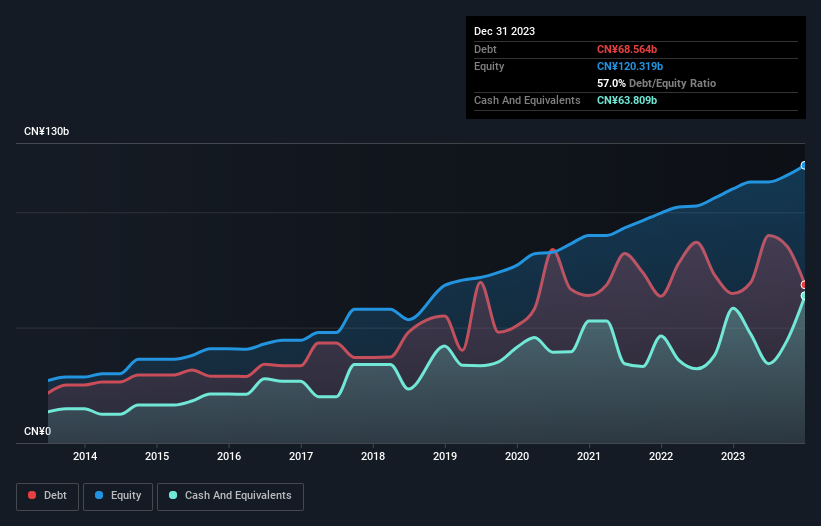
The external fund manager backed by Berkshire Hathaway's Charlie Munger, Li Lu, makes no bones about it when he says 'The biggest investment risk is not the volatility of prices, but whether you will suffer a permanent loss of capital.' So it seems the smart money knows that debt - which is usually involved in bankruptcies - is a very important factor, when you assess how risky a company is. As with many other companies Sinopharm Group Co. Ltd. (HKG:1099) makes use of debt. But the more important question is: how much risk is that debt creating?
When Is Debt Dangerous?
Debt and other liabilities become risky for a business when it cannot easily fulfill those obligations, either with free cash flow or by raising capital at an attractive price. In the worst case scenario, a company can go bankrupt if it cannot pay its creditors. However, a more frequent (but still costly) occurrence is where a company must issue shares at bargain-basement prices, permanently diluting shareholders, just to shore up its balance sheet. Of course, debt can be an important tool in businesses, particularly capital heavy businesses. The first step when considering a company's debt levels is to consider its cash and debt together.
View our latest analysis for Sinopharm Group
What Is Sinopharm Group's Net Debt?
The image below, which you can click on for greater detail, shows that at December 2023 Sinopharm Group had debt of CN¥68.6b, up from CN¥64.7b in one year. However, it does have CN¥63.8b in cash offsetting this, leading to net debt of about CN¥4.76b.

How Healthy Is Sinopharm Group's Balance Sheet?
Zooming in on the latest balance sheet data, we can see that Sinopharm Group had liabilities of CN¥241.5b due within 12 months and liabilities of CN¥21.6b due beyond that. Offsetting this, it had CN¥63.8b in cash and CN¥185.8b in receivables that were due within 12 months. So it has liabilities totalling CN¥13.5b more than its cash and near-term receivables, combined.
While this might seem like a lot, it is not so bad since Sinopharm Group has a market capitalization of CN¥57.3b, and so it could probably strengthen its balance sheet by raising capital if it needed to. But it's clear that we should definitely closely examine whether it can manage its debt without dilution.
We use two main ratios to inform us about debt levels relative to earnings. The first is net debt divided by earnings before interest, tax, depreciation, and amortization (EBITDA), while the second is how many times its earnings before interest and tax (EBIT) covers its interest expense (or its interest cover, for short). The advantage of this approach is that we take into account both the absolute quantum of debt (with net debt to EBITDA) and the actual interest expenses associated with that debt (with its interest cover ratio).
Sinopharm Group's net debt is only 0.19 times its EBITDA. And its EBIT easily covers its interest expense, being 10.3 times the size. So we're pretty relaxed about its super-conservative use of debt. While Sinopharm Group doesn't seem to have gained much on the EBIT line, at least earnings remain stable for now. There's no doubt that we learn most about debt from the balance sheet. But it is future earnings, more than anything, that will determine Sinopharm Group's ability to maintain a healthy balance sheet going forward. So if you're focused on the future you can check out this free report showing analyst profit forecasts.
Finally, a company can only pay off debt with cold hard cash, not accounting profits. So we always check how much of that EBIT is translated into free cash flow. During the last three years, Sinopharm Group produced sturdy free cash flow equating to 61% of its EBIT, about what we'd expect. This cold hard cash means it can reduce its debt when it wants to.
Our View
Sinopharm Group's net debt to EBITDA suggests it can handle its debt as easily as Cristiano Ronaldo could score a goal against an under 14's goalkeeper. And the good news does not stop there, as its interest cover also supports that impression! We would also note that Healthcare industry companies like Sinopharm Group commonly do use debt without problems. When we consider the range of factors above, it looks like Sinopharm Group is pretty sensible with its use of debt. While that brings some risk, it can also enhance returns for shareholders. Given Sinopharm Group has a strong balance sheet is profitable and pays a dividend, it would be good to know how fast its dividends are growing, if at all. You can find out instantly by clicking this link.
Of course, if you're the type of investor who prefers buying stocks without the burden of debt, then don't hesitate to discover our exclusive list of net cash growth stocks, today.
New: Manage All Your Stock Portfolios in One Place
We've created the ultimate portfolio companion for stock investors, and it's free.
• Connect an unlimited number of Portfolios and see your total in one currency
• Be alerted to new Warning Signs or Risks via email or mobile
• Track the Fair Value of your stocks
Have feedback on this article? Concerned about the content? Get in touch with us directly. Alternatively, email editorial-team (at) simplywallst.com.
This article by Simply Wall St is general in nature. We provide commentary based on historical data and analyst forecasts only using an unbiased methodology and our articles are not intended to be financial advice. It does not constitute a recommendation to buy or sell any stock, and does not take account of your objectives, or your financial situation. We aim to bring you long-term focused analysis driven by fundamental data. Note that our analysis may not factor in the latest price-sensitive company announcements or qualitative material. Simply Wall St has no position in any stocks mentioned.
About SEHK:1099
Sinopharm Group
Engages in the wholesale and retail of pharmaceutical and healthcare products, and medical devices in the People’s Republic of China.
Flawless balance sheet, undervalued and pays a dividend.
Similar Companies
Market Insights
Community Narratives



